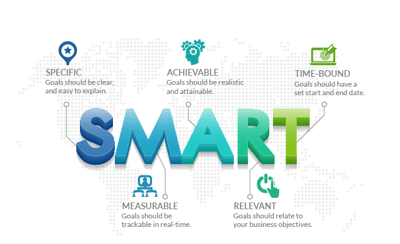Our Ahead of the Curve webinar series continued this week, with an informative session on web analytics. This time, WSI Digital Marketing Consultant, Andreas Mueller-Schubert, joined us from the beautiful Napa Valley region in California, USA. During the presentation, he showed how he uses data and analytics to help pivot and adjust his clients’ digital marketing strategies.
In addition to sharing several tools and tips that you can use to leverage data in your decision-making process, he also talked about the concept of SMART goals.
Many of our webinar attendees had questions about what SMART goals are and how you define them. As part of our recap, we’ve outlined what a SMART goal is and how you can easily set them for your business.
If you missed our session on web analytics and web reporting and “How to Track the Metrics that Matter Most to Your Business,” we have included the full webinar recording at the end of this blog post.
What is a SMART goal?
SMART is an acronym used to help marketers best define their business goals. It helps ensure that the goals you are setting for your digital marketing strategy are actionable and attainable. We break down each aspect of a SMART goal below.

S – Specific
Your goals should be clearly defined, and they should be easy to communicate to others. You should be able to explain, in precise terms, what each of your goals is and how they relate to your overall business objectives.
M – Measurable
Your goals should lend themselves well to data analysis. You should be able to track them in real-time, and you should know right away when they’ve been met or failed to deliver.
A – Achievable
Your goals should be realistic. Don’t aim low, but don’t let your goals get out of control, either. If your company made $1,250,000 in revenue last year, for example, don’t base your goals around making $4,250,000 this year. You want your team to feel inspired, not that they have an impossible mountain to climb.
R – Relevant
Your goals should relate to your big picture intentions. Brand awareness is essential, but you should be able to connect most — if not all — of your goals to real sales objectives.
T – Time-Bound
Your goals should have a designated start and end date. Working from a timeline is necessary not just for defining your goals but for measuring them. It will also help you stay consistent with your tracking methods.
If a goal doesn’t pass the SMART test, try to rework it until it does. If no amount of redefining gets it to where it needs to be, drop it, and focus on the business goals that you know will help move your business forward in clear and concrete ways.
For more details on how you can use your SMART goals, and other data points to help pivot your current marketing and SEO strategies, watch the recording from our webinar, How to Track the Metrics that Matter Most to Your Business (posted below). We also encourage you to listen to our other recordings and register for our upcoming session on our Ahead of the Curve page.







